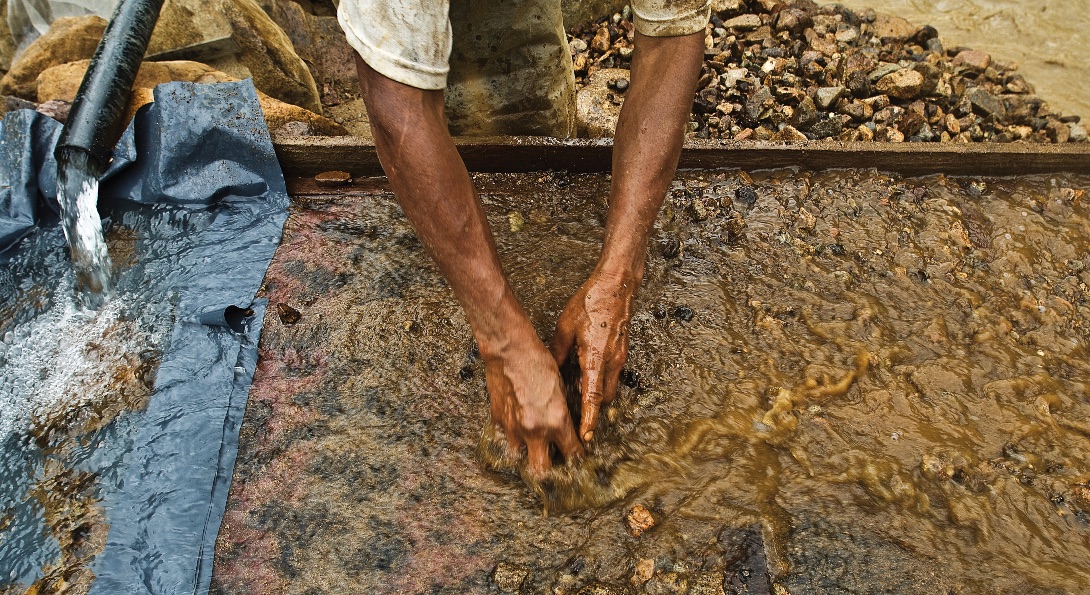Stronger Value Chains Are Vital for Artisanal Small-Scale Mining
April 15, 2024

The forum discusses good practices and innovations for a sustainable and inclusive future of artisanal and small-scale mining.
Lusaka, Zambia - An international event is taking place in Lusaka, Zambia this week, which is aimed at improving practices in the artisanal and small-scale mining (ASM) of Development Minerals. These are minerals such as construction materials, industrial minerals and semi-precious stones the mining of which support the livelihoods of millions of people, mostly in African countries.
The Forum on Sustainable and Inclusive Mineral Value Chains enables participants to share knowledge and innovations in artisanal and small-scale mining, on more sustainable and inclusive mining practices, and on value-addition to Development Minerals.
Being held from 15-17 April 2024, this forum is being held under held under the European Union (EU) and the Organization of African, Caribbean and Pacific States (OACPS, formerly ACP) Partnership Framework.
It is organized by the United Nations Development Programme, implementing the ACP-EU Development Minerals Programme, as well as the Government of the Republic of Zambia, and the African Minerals Development Centre (AMDC/AUC).
Over 140 participants from African, Caribbean and Pacific countries are attending this event. They represent stakeholders from across the development minerals and ASM sectors, including mining authorities, environmental agencies, artisanal miners and cooperatives, small-scale manufacturing companies, the Chambers of Mines, and representatives from international organizations.
Participants will attend presentations and panel discussions focusing on successful sustainable and inclusive ASM practices. They also explore new topics like low-carbon materials, linkages between mining and local economies, circular economy, innovations for ASM, and incorporating digital tools and marketing into the ASM sector.
A dedicated session focuses on the unique challenges and opportunities presented by artisanal mining of critical minerals, that are crucial to the advancement of the renewable energy sector.
“This forum is an opportunity for stakeholders to come together to learn from good practices and innovations for a sustainable and inclusive future of artisanal and small-scale mining.” said James Wakiaga, Resident Representative, UNDP Zambia.
The forum marks the launch of Phase III of the ACP-EU Development Minerals Programme implemented by UNDP. It revisits the Mosi-oa-Tunya Declaration of 2018 on Artisanal and Small-Scale Mining, Quarrying and Development and showcases activities and practices by partners and participating countries implementing the Development Minerals Programme.
The event also features an exhibition showcasing products made by artisanal and small-scale mining and value-addition enterprises supported by the ACP-EU Development Minerals Programme, and will include practical demonstrations.
“Since 2015, the ACP-EU Development Minerals Programme has been instrumental in raising awareness on the importance of Development Minerals, fostering capacity building, and promoting the formalization of artisanal miners, resulting in improved livelihoods across OACPS countries”, said Junior Lodge, Assistant Secretary-General for Structural Economic Transformation and Trade of the OACPS Secretariat.
The forum will be followed by two-day training sessions for select participants on business and financial planning, and better governance of ASM on 18-19 April.
The ACP-EU Development Minerals Programme implemented in partnership with UNDP has made a significant impact in artisanal mining of Development Minerals which play a crucial role in job creation and local economic development. It has trained over 12,000 miners and stakeholders and included nearly 40,000 people in knowledge sharing and awareness raising activities, with a significant emphasis on women’s participation since 2015. As a result of its work, at least 800 mining cooperatives, with tens of thousands of members were newly formed or formalized in Zambia, Uganda, Cameroon and Guinea.
Additionally, the Programme has facilitated a shift towards more diversified economic activities, improving capacity to add value to Development Minerals. Training and job creation for men, women and youth has contributed to local economic development from Fiji to Uganda to Zambia, from Guinea to Jamaica, and contributed to peace and stability in post-conflict areas, such as in the Far North of Cameroon.
As the Development Minerals Programme embarks on its third phase, the continued support from the EU and the partnership with the Organisation for African, Caribbean and Pacific States (OACPS) signal a promising future for artisanal and small-scale mining, aligning it closely with Sustainable Development Goals.
For more information, and media enquiries please contact:
Zambia: Mercy Khozi, Communications lead UNDP Zambia mercy.khozi@undp.org
Addis Ababa: Ngele Ali, Regional Communications Advisor, Africa ngele.ali`@undp.org
Panama: Marcela Barrientos, Regional Communications Specialist, Latin America and the Caribbean: marcela.barrientos@undp.org
Bangkok: Cedric Monteiro, Regional Communications Specialist, Asia and the Pacific: cedric.monteiro@undp.org

 Locations
Locations


